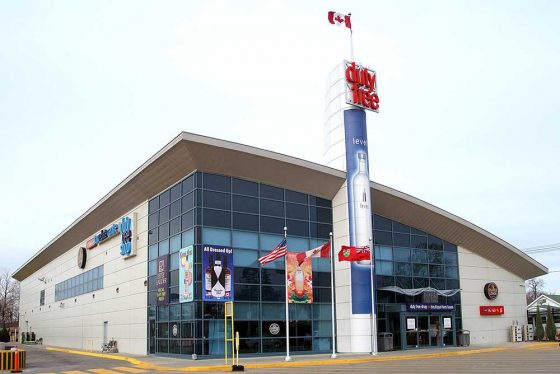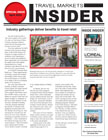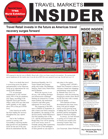While most of the Canadian land border stores have closed their doors during the COVID-19 pandemic, Blue Water Bridge Duty Free in Point Edward, Ontario has remained open to essential traffic.
But Blue Water Bridge Duty Free’s business over this period has been “decimated,” Tania Lee, Vice President, tells TMI.
“The worst case scenario for any duty free store is the closure of the bridge or the border. If you look at the traffic crossing our bridge the cars are down 97-98%. Commercial truck traffic over the bridge has decreased around 45% year over year,” says Lee.
“The core business for us is derived from car traffic, because they can buy everything. Commercial traffic has a lot of restrictions on it: they can’t buy liquor for example. They would be the smallest portion of our business. But the commercial traffic is now our business.”
Lee says at first they were not sure they should stay open, but realized that the commercial truck drivers needed the services that Blue Water Bridge Duty Free could provide.
“When we decided to stay open we knew that only essential traffic was allowed to go through, which would be predominantly truck traffic and essential cars. We soon found that since everything was closed the truck drivers were not getting any services: they could not go through any drive-thru, no restaurants are open, and washrooms are closed,” says Lee.
“Truck drivers are using our restrooms, having some food, making a purchase. It has become really important for us to stay open for our commercial business.”
Commercial truck drivers are restricted from purchasing liquor, but they are buying cigarettes and a few toiletries.
“Tobacco is the bulk of the business. We have seen some of our deodorants and deodorant sprays moving, which I attribute to the truck drivers, and some colognes.”
Despite the minimal traffic and sales, Lee says it is imperative that the company keeps its staff.
“We have been in business a long, long time, since 1986. And our goal, with my dad, the founder, has always been ‘We will stay open and keep our core staff employed. We don’t lay people off.’ That was our big concern. Today our goal is still to remain open and keep our core staff employed. And it has become more and more apparent that we need to provide the needed services to our commercial traffic,” she says.
“We are cognizant of minimizing our expenses. We are seeking relief from any of the government sources that we can. We have our staff to pay. We have our bills to pay. We have our overhead to pay. We have worked with some of our suppliers to return product and they have been really good partners.”
Border closing extended
With the announcement this week that the US-Canada border will remain closed to nonessential travel for at least another month, Lee does not know when her store will be open for all customers.
“At first I thought this would last for a few weeks. Now I am thinking more like the end of July, the end of August. And July and August are our two busiest months. If we go all the way through into August we lose all of our summer months.”
Lee says they are looking at how Blue Water Bridge Duty Free can “hit the ground running” when it is allowed to open when the border finally opens.
“Once the authorities say our stores can open fully, how do we stimulate our business right off the bat so that we can come back quickly?
Blue Water Bridge Duty Free will be carrying the most relevant products when it opens to all traffic, says Lee.
“We have placed a huge order for masks and have reached out to see if we can get more sanitizers. We were fortunate that we had installed an ozone water system in our store, which allows us to sanitize very quickly. This ozone system is effective at sanitizing for 24 hours at a time.”
Catering to different customers
Blue Water Bridge has classified returning customers under three pillars.
“First are those wanting curb-side pickup. We think that first customers will be so used to click and collect and curbside pickup that they will expect the same from us,” she says.
“Then there is the ‘dash in and dash out’ customer, grab and go. We are seeing it now with the truck drivers. They come in quickly, they grab what they want, known brands, and they run, because they don’t want to have any contact with people.
“The third tier might be our traditional customer, which will probably be the smallest tier until a vaccine is found. They will come in and interact with our sales staff.”
When customers return, Blue Water Bridge Duty Free will have new safety rules in effect.
“The customer also will have to cover their faces, wash their hands, and maintain social distancing from all our staff. We have queues ready with markings on the floor showing where they have to wait in lines six to eight feet or more apart. We also have shields in place at our cash registers,” says Lee.
“We have to keep our employees safe. And we have to make our customers feel safe when they come in to Blue Water Bridge Duty Free.”











